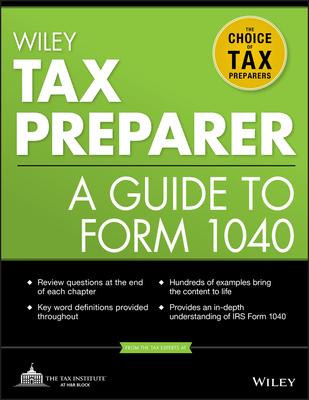Whether you're already a tax preparer or you're looking to become one, you need a firm grasp of the tax concepts on which individual taxation is based. We created the Wiley Tax Preparer as a refresher for the experienced tax preparer, and as a readable guide for the less-experienced tax preparer.
This timely guide is an essential tax resource providing you with useful information on tax principles and filing requirements that a preparer must know to complete a 1040 series return and associated schedules. You'll refer to it time and again, for information about:
Practices and Procedures
- Penalties to be assessed by the IRS against a preparer for disregard of the rules and regulations
- Furnishing a copy of a return to a taxpayer
- Safeguarding taxpayer information
Treatment of Income and Assets
- Taxability of wages, salaries, tips, and other earnings
- Reporting requirements of Social Security benefits
- Determination of basis of assets
Deductions and Credits
- Medical and dental expenses
- Types of interest and tax payments
- Child and dependent care credit
Other Taxes
- Alternative Minimum Tax
- Self-Employment Tax
Preliminary Work and Collection of Taxpayer Data
- Collecting a taxpayer's filing information and determining their status
- Determine filing requirements, including extensions and amended returns
- Personal exemptions and dependents
Completion of the Filing Process
- Check return for completeness and accuracy
- Tax withholding, payment and refund options, and estimated tax payments
- Explaining and reviewing the tax return
Ethics and Circular 230
- Preparer's due diligence for accuracy of representations made to clients and the IRS
- Sanctions that may be imposed under Circular 230
- Rules governing authority to practice before the IRS
If you're looking for a practical guide to the principles behind Form 1040, look no further. The Wiley Tax Preparer is the most accessible guide to understanding how complex tax laws affect individual taxpayers.
